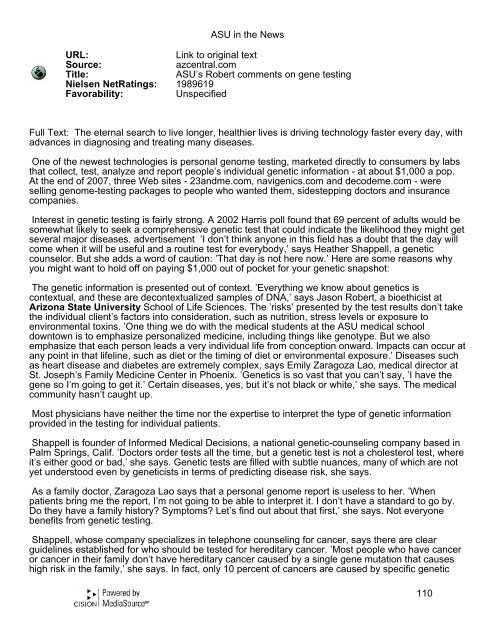asu in the news 02-06-08 to - ASU News - Arizona State University
asu in the news 02-06-08 to - ASU News - Arizona State University
asu in the news 02-06-08 to - ASU News - Arizona State University
- No tags were found...
Create successful ePaper yourself
Turn your PDF publications into a flip-book with our unique Google optimized e-Paper software.
<strong>ASU</strong> <strong>in</strong> <strong>the</strong> <strong>News</strong><br />
URL: L<strong>in</strong>k <strong>to</strong> orig<strong>in</strong>al text<br />
Source: azcentral.com<br />
Title: <strong>ASU</strong>’s Robert comments on gene test<strong>in</strong>g<br />
Nielsen NetRat<strong>in</strong>gs: 1989619<br />
Favorability: Unspecified<br />
Full Text: The eternal search <strong>to</strong> live longer, healthier lives is driv<strong>in</strong>g technology faster every day, with<br />
advances <strong>in</strong> diagnos<strong>in</strong>g and treat<strong>in</strong>g many diseases.<br />
One of <strong>the</strong> newest technologies is personal genome test<strong>in</strong>g, marketed directly <strong>to</strong> consumers by labs<br />
that collect, test, analyze and report people’s <strong>in</strong>dividual genetic <strong>in</strong>formation - at about $1,000 a pop.<br />
At <strong>the</strong> end of 2007, three Web sites - 23andme.com, navigenics.com and decodeme.com - were<br />
sell<strong>in</strong>g genome-test<strong>in</strong>g packages <strong>to</strong> people who wanted <strong>the</strong>m, sidestepp<strong>in</strong>g doc<strong>to</strong>rs and <strong>in</strong>surance<br />
companies.<br />
Interest <strong>in</strong> genetic test<strong>in</strong>g is fairly strong. A 20<strong>02</strong> Harris poll found that 69 percent of adults would be<br />
somewhat likely <strong>to</strong> seek a comprehensive genetic test that could <strong>in</strong>dicate <strong>the</strong> likelihood <strong>the</strong>y might get<br />
several major diseases. advertisement ’I don’t th<strong>in</strong>k anyone <strong>in</strong> this field has a doubt that <strong>the</strong> day will<br />
come when it will be useful and a rout<strong>in</strong>e test for everybody,’ says Hea<strong>the</strong>r Shappell, a genetic<br />
counselor. But she adds a word of caution: ’That day is not here now.’ Here are some reasons why<br />
you might want <strong>to</strong> hold off on pay<strong>in</strong>g $1,000 out of pocket for your genetic snapshot:<br />
The genetic <strong>in</strong>formation is presented out of context. ’Everyth<strong>in</strong>g we know about genetics is<br />
contextual, and <strong>the</strong>se are decontextualized samples of DNA,’ says Jason Robert, a bioethicist at<br />
<strong>Arizona</strong> <strong>State</strong> <strong>University</strong> School of Life Sciences. The ’risks’ presented by <strong>the</strong> test results don’t take<br />
<strong>the</strong> <strong>in</strong>dividual client’s fac<strong>to</strong>rs <strong>in</strong><strong>to</strong> consideration, such as nutrition, stress levels or exposure <strong>to</strong><br />
environmental <strong>to</strong>x<strong>in</strong>s. ’One th<strong>in</strong>g we do with <strong>the</strong> medical students at <strong>the</strong> <strong>ASU</strong> medical school<br />
down<strong>to</strong>wn is <strong>to</strong> emphasize personalized medic<strong>in</strong>e, <strong>in</strong>clud<strong>in</strong>g th<strong>in</strong>gs like genotype. But we also<br />
emphasize that each person leads a very <strong>in</strong>dividual life from conception onward. Impacts can occur at<br />
any po<strong>in</strong>t <strong>in</strong> that lifel<strong>in</strong>e, such as diet or <strong>the</strong> tim<strong>in</strong>g of diet or environmental exposure.’ Diseases such<br />
as heart disease and diabetes are extremely complex, says Emily Zaragoza Lao, medical direc<strong>to</strong>r at<br />
St. Joseph’s Family Medic<strong>in</strong>e Center <strong>in</strong> Phoenix. ’Genetics is so vast that you can’t say, ’I have <strong>the</strong><br />
gene so I’m go<strong>in</strong>g <strong>to</strong> get it.’ Certa<strong>in</strong> diseases, yes, but it’s not black or white,’ she says. The medical<br />
community hasn’t caught up.<br />
Most physicians have nei<strong>the</strong>r <strong>the</strong> time nor <strong>the</strong> expertise <strong>to</strong> <strong>in</strong>terpret <strong>the</strong> type of genetic <strong>in</strong>formation<br />
provided <strong>in</strong> <strong>the</strong> test<strong>in</strong>g for <strong>in</strong>dividual patients.<br />
Shappell is founder of Informed Medical Decisions, a national genetic-counsel<strong>in</strong>g company based <strong>in</strong><br />
Palm Spr<strong>in</strong>gs, Calif. ’Doc<strong>to</strong>rs order tests all <strong>the</strong> time, but a genetic test is not a cholesterol test, where<br />
it’s ei<strong>the</strong>r good or bad,’ she says. Genetic tests are filled with subtle nuances, many of which are not<br />
yet unders<strong>to</strong>od even by geneticists <strong>in</strong> terms of predict<strong>in</strong>g disease risk, she says.<br />
As a family doc<strong>to</strong>r, Zaragoza Lao says that a personal genome report is useless <strong>to</strong> her. ’When<br />
patients br<strong>in</strong>g me <strong>the</strong> report, I’m not go<strong>in</strong>g <strong>to</strong> be able <strong>to</strong> <strong>in</strong>terpret it. I don’t have a standard <strong>to</strong> go by.<br />
Do <strong>the</strong>y have a family his<strong>to</strong>ry? Symp<strong>to</strong>ms? Let’s f<strong>in</strong>d out about that first,’ she says. Not everyone<br />
benefits from genetic test<strong>in</strong>g.<br />
Shappell, whose company specializes <strong>in</strong> telephone counsel<strong>in</strong>g for cancer, says <strong>the</strong>re are clear<br />
guidel<strong>in</strong>es established for who should be tested for hereditary cancer. ’Most people who have cancer<br />
or cancer <strong>in</strong> <strong>the</strong>ir family don’t have hereditary cancer caused by a s<strong>in</strong>gle gene mutation that causes<br />
high risk <strong>in</strong> <strong>the</strong> family,’ she says. In fact, only 10 percent of cancers are caused by specific genetic<br />
110


